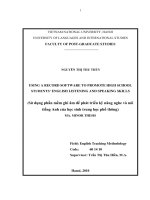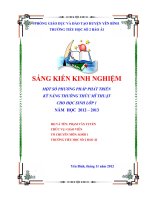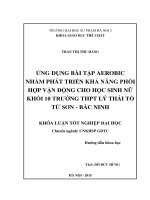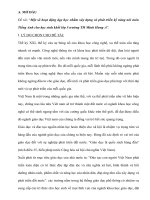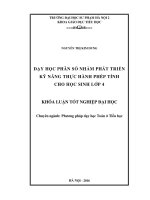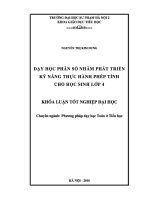Khai thác hiệu quả phòng Internet để phát triển kỹ năng tổng hợp tin tức cho học viên khoa Quan hệ quốc tế Học viện Khoa học Quân sự
Bạn đang xem bản rút gọn của tài liệu. Xem và tải ngay bản đầy đủ của tài liệu tại đây (333.4 KB, 6 trang )
NGHIÊN CỨU - TRAO ĐỔI v
KHAI THÁC HIỆU QUẢ PHÒNG INTERNET
ĐỂ PHÁT TRIỂN KỸ NĂNG TỔNG HỢP TIN TỨC
CHO HỌC VIÊN KHOA QUAN HỆ QUỐC TẾ
HỌC VIỆN KHOA HỌC QUÂN SỰ
ĐỖ VĂN TOÀN*
*
Học viện Khoa học Quân sự, ✉
Ngày nhận: 13 /4/2017; Ngày hoàn thiện: 06/5/2017; Ngày duyệt đăng: 10/5/2017
TÓM TẮT
Đối với học viên Quan hệ Quốc tế, Học viện Khoa học Quân sự, việc rèn luyện phát triển kỹ năng
tổng hợp tin tức là rất quan trọng bởi tổng hợp tin tức quốc tế là một trong những nhiệm vụ học
viên phải đảm nhiệm sau khi tốt nghiệp trên cương vị ban đầu là trợ lý đối ngoại. Để phát triển kỹ
năng trên cho học viên, giảng viên có thể hướng dẫn học viên khai thác hiệu quả phòng-thư viện
Internet của Học viện. Bài viết này trình bày tầm quan trọng và những lợi ích của việc hướng dẫn
học viên khai thác Internet để tổng hợp báo cáo tin tức quốc tế, từ đó gợi ý các bước giảng dạy và
đặt ra những yêu cầu đối với giảng viên đảm nhiệm giờ học này.
Từ khóa: khai thác Internet, quan hệ quốc tế, tin tức, tổng hợp tin tức quốc tế.
INTRODUCTION
For cadets of International Relations at
Military Science Academy, learning to report
current affairs is necessary because reporting
news is one of their future responsibilities as
international relations officers. The Internet,
with its ‘abundance of authentic material and
information’ (Motteram, 2013, p.98), can be a
useful tool to help the cadets hone their news
reporting skills. How to employ this tool is a
matter of concern for lecturers of the International
Relations Department.
This article discusses exploiting the Internet
room of Military Science Academy to develop
news reporting skills for cadets of International
Relations. Firstly, the article presents two major
reasons why it is important to teach these skills
to the cadets. It then discusses the benefits
of using the Internet to gather topical news,
followed by some general requirements for a
news report. The two last sections of the article
will suggest some teaching procedures and lay
out requirements for teachers in charge of this
skills development lesson. For the sake of its
length, the article focuses on news reports which
are done orally only, not in writing.
IMPORTANCE OF TEACHING NEWS
REPORTING SKILLS
Cadets of International Relations at Military
Science Academy are trained to become
international relations officers after graduation.
KHOA HỌC NGOẠI NGỮ QUÂN SỰ
Số 07 - 5/2017
93
v NGHIÊN CỨU - TRAO ĐỔI
One of their responsibilities is research and write
reports on current affairs all over the world.
Teaching them how to report news compiled
from a wide range of sources is very important
since this practice helps the learners develop
occupational skills, such as searching for needed
information, to handle future tasks assigned by
their superiors.
resources avalable for public use. When being
asssiged to report a particular event, the cadets
can access various articles, each written in
its own stand, covering the story. This is very
beneficial to the learners as their thinking is not
framed by any one-sided opinion while they
analyze world news stories which are often
complex and contingent in their developments.
When the cadets work on the assigned news
on the Internet, they enrich their specialized
background knowledge (Motteram, 2013,
p.131). This knowledge is essential to develop
their expertise which is needed to fulfill the
asignments of many academic subjects during
their course at the Academy. Such subjects as
History of International Relations, Vietnam’s
Foreign Policy and Theories of International
Relations require the cadets to have a deep
accquaintance with not merely past stories but
also updated news in politics both in Vietnam
and around the world. Thus, they might risk
producing naive research were they to support
their arguments with insufficient knowledge.
When reading news online, the learners
can also improve their command of English in
general and their language skills in particular
(Motteram, 2013, p.101).
Researching
various sources of news and interpreting
their authors’ views enhance the learners’
reading comprehension ability and enrich their
vocabulary. Also, discussing what they have
collected with their peers in the class helps them
develop their speaking skills and, at the same
time, consolidates the acquired language items.
Besides, the learners’ listening ability can be
upgraded when they work on online video news
reports. Thus, the learners’ language intake is
much facilitated through this intergrated skills
practice (Hirvela, 2012).
BENEFITS OF USING THE INTERNET
TO RESEARCH NEWS
There are various ways to research news. For
example, one can read conventional newspapers
to grasp what is going on in world politics, listen
to news reports on a local radio station, or go to a
library to obtain a detailed account of a news story.
Unfortunately, these ways may not satisfy those
who wish to access not just the past events of a
story but also its current developments. However,
as a ‘World Bank of information’ (Loan, 2012),
the Internet can accommodate such needs of the
news researchers; in fact, it can bring substantial
benefits for cadets of International Relations in
producing news reports, and below are three
prominent advantages in the writer’s view.
Most major press corporations and official
portals publish news and information on
particular topics on the Internet with many
94
KHOA HỌC NGOẠI NGỮ QUÂN SỰ
Số 07 - 5/2017
Finally, in terms of language acquisition
psychology, the learners’ enthusiasm for
learning is stimulated when there is a switch
from conventional learning environment with
much familiar arrangements to a new one with
different settings (Hannah, 2013). Also, the
online material with up-to-date information and
topics is ‘more motivating’ for the learners than
traditional textbooks (Motteram, 2013, p.101).
These postitive effects, thus, can make up for the
cadets’ possible tiredness caused by working on
news reports within the stipulated time.
REQUIREMENTS OF A NEWS REPORT
News reports come in different forms
depending on the assigner’s requirements. For
example, a news report to be shared within a
small group can be dissimilar from the one to be
presented to a larger audience or the one to be
NGHIÊN CỨU - TRAO ĐỔI v
submitted to a superior. The teacher may wish to
remind the cadets to be aware of this flexibility.
But whatever a particular requirement might be,
the writer suggests that a news report should do
at least the following.
Present accurate and credible information.
Numerous reports covering a single event
mean a varitey of views reflecting and explaining
it. The cadets should be taught to retell these
reports accurately, without exaggerating or
understating any views. Moreover, the news
reports should be credible with identified
sources. The cadets’ linguistic ability also plays
an important role in interpreting the published
news because simplistic intepretation of an
utterance could lead to improper reflection of it.
All these are critical, especially in the military
context where leaders’ direction is often based
on their inferiors’ reports.
Summarize different views on the issue.
An occurance in politics is better understood
when it is studied from different viewpoints. It is
the reporter’s responsibility to select and include
most valuable positions. When news reporting
skills are practiced in the class, it lies with the
teacher to provide a ‘rich’ requried reading list
for the cadets. The reading should reflect multiple perspectives to make sure that coverage of a
news story is not one-sided.
Provide conclusions or recommendations
from what has been reported.
In the military, news reports are made to be
submited to superiors. Providing conclusions
or recommendations at the end of the report is
needed, for the superiors often base on these
lines to give directive instructions. The cadets,
therefore, should have the opportunity to practice
formulating their recommendations from what
they have collected. This part is not necessarily
too long in a news report, but it should be clear
and concise to meet the superiors’ needs.
TARGETED LEARNERS FOR NEWS
REPORTING LESSONS
Most English news is written with nativelevel linguistic sophistication. For this reason,
it seems that reporting news is only suitable for
third and fourth year cadets when their language
skills are more proficient, and it could be an
obstable to learners with a poorer command of
English. Fortunately, a number of news websites,
such as voanews.com with its Special English
site and bbc.co.uk with its Learning English site,
provide simpler English news reports for lowerlevel language learners. Therefore, freshmen
and sophomores can work on these special sites
to research news. In fact, however difficult the
language of an article is, experienced teachers
would know how to design the reporting tasks
to suit their cadets’ linguistic ability. This means
easier research questions can be assigned to
learners with lower linguistic competence
while more difficult ones to learners with better
command of English (Harmer, 2001, p.127).
PROCEDURES FOR TEACHING NEWS
REPORTING SKILLS
Below are two workable plans that the
teacher can follow: one with all activities done
within a two-period lesson’s time (90 minutes)
and the other with some researching activities
done prior to the lesson.
For all-in-one lessons
First of all, the teacher assigns the cadets
research questions accompanied by a list of
required links and articles. The cadets then
access the Internet, reading those articles to
answer the questions. After this, the cadets work
in groups, discussing what they have collected.
Each group then presents their collaborative
work in front of the class, followed by other
groups asking questions or voicing their views
on their presented material. At the end of the
lesson, the teacher can draw some conclusions
on the researched topics, give comments on the
KHOA HỌC NGOẠI NGỮ QUÂN SỰ
Số 07 - 5/2017
95
v NGHIÊN CỨU - TRAO ĐỔI
research methods used by the cadets, provide
some language correction if necessary, etc.
This plan is more suitable for those
cadets with greater linguistic proficiency
since it requires the learners to work very
hard and possibly causes some stress due to
the workload. In fact, international relations
officers may sometimes have to work under
pressure to meet the deadline of their assigned
reports. For this reason, the 90-minute lesson
is a good opportunity for the learners to
prepare themselves for their future tasks.
For lessons with the cadets’ prior preparation
The teaching procedures are similar to those
of the all-in-one lessons above except that the step
of researching news online has already been done
prior to the lesson. The cadets then have more
time for discussing their gathered news. Further
investigation into the assigned issue could be
done right in the Internet room when necessary
under the teacher’s instruction and observation.
To begin with, the teacher should make sure
that the cadets have been familiar with working
in groups. Such groupwork skills as sharing
information, discussing, and assigning roles
should have been practiced in previous lessons.
When the cadets have already mastered those
skills, they will spend more time on their research
work. This way, the outcome of groupwork can
be maximized (Ellis et al., 2005).
Second, the teacher needs to instruct the
cadets how to research news from different
sources, read effectively, take notes, present
what has been collected, and, when required,
provide recommendations on the researched
news. These study skills should be introduced
and practiced in the first lessons. According
to Gettinger and Seibert (2002, p.350), the
‘knowledge and application of study skills’
would help the learners to ‘acquire, organize,
retain and use’ information efficiently; and this
can enhance their performance and competence.
REQUIREMENTS FOR TEACHERS
Third, the teacher should be well-prepared,
understanding deeply the topics assigned to the
cadets. A list of articles and their links should be
given to the learners so that the teacher can have
control over what they read. For developing news
stories, the teacher may wish to update them
right in the class in addition to managing and
observing the learners. As Harmer (2001, p.121)
points out, the teacher needs to have planned
in advance, ‘have a destination they want their
students to reach’, and remain ‘flexible’ in the
class. All these will contribute to the teacher’s
effective prompts for the learners, especially in
the news reporting skills development lesson.
A lesson conducted in the Internet room is
different from that in a conventional classroom.
For example, the news stories can be up to the
minute, or the learners may be distracted from
their assignments due to other things on the
Internet. Therefore, the teacher needs to comply
with a number of requirements in order for the
lesson to be fruitful.
Fourth, the teacher should master the
English language knowledge to a certain degree,
especially vocabulary associated with the
assigned topics. In fact, there are chances that
some political terms, phrases, and expressions
are out of the teacher’s awareness zone. A
thorough study into the related language would
help the teacher manage linguistic situations well
This plan is more suitable for those cadets
with lower linguistic competence since they have
more time for preparation. The teacher may have
to work harder, however, giving more careful
instruction and more detailed feedback. This
plan can also work for the learners with better
command of English when the teacher wishes
to make a change in the teaching procedures
or when the researched issues are more
complicated, asking for discussion at great length.
96
KHOA HỌC NGOẠI NGỮ QUÂN SỰ
Số 07 - 5/2017
NGHIÊN CỨU - TRAO ĐỔI v
in the lesson. However, according to Harmer
(2007, p.110), the teacher should not be be an
all-time resource for the learners who sometimes
need to look for the answers themselves under
the teacher’s guidance.
Fifth, the teacher should have good class
management skills to deal with study problems
in the class (Harmer, 2007, p.153-155). This
is because rows of computers in the Internet
room are arranged differently from desks and
chairs are in a conventional classroom, and the
teacher cannot see all the learners’ screens at the
same time. Some cadets may be distracted from
their main job by the lure of other things on the
Internet. An experienced teacher would know
how to encourage the cadets to focus on their
work and bring those distracted back to their
tasks. It is important that a set of regulations for
working in the Internet room be introduced, and
the teacher may wish to remind the cadets of
those rules before each lesson if need be.
Sixth, the teacher should master some
techniques for researching online news
(Dudeney and Hockly, 2007, p.29-34). There are
a number of ways to find exactly what you are
looking for in most cases on the Internet. Also,
it should come to the teacher’s knowledge that
there are those websites with reliable contents
and those without. When the cadets are aware of
all these, possible harm or drawbacks could be
avoided. The teacher can introduce and let the
cadets practice all the techniques for working
online in the first lessons of the class.
Finally, the teacher may want to anticipate
what might happen technically when the class
is in progress, and adopt appropriate solutions
(Maher, n.d.). For example, there should be an
alternative, which has been prepared in advance,
when there is a sudden power cut. Similarly, when
the Internet service breaks down or its download
speed is too slow, the teacher should switch to
some substitutes. Another unwanted possibility
is that when an individual link to an important
required article does not work, the teacher
may provide the learners with another working
analogue. Thus, teaching in the Internet room
does need the teacher to make contigency plans.
CONCLUSION
Using the Internet room to teach news
reporting skills to cadets of International
Relations is needed since this practice helps
them improve their English language skills,
build their International Relations background
knowledge, and train their professional skills
needed for future work. There are numerous
things the teacher needs to do for the lesson in
the Internet room to be successul, from preparing
the material to adopting a workable procedure,
anticipating unexpected technical situations, and
meeting a series of requirements.
Future studies on exploiting the Internet
room can focus on development of other
English language skills or those skills in other
foreign languages being taught at Military
Science Academy.
References:
1. Dudeney, G. and Hockly, N. (2007), How
to Teach English with Technology, Longman,
Harlow.
2. Ellis, A. P. J., Bell, B. S., Ployhard, R. E.,
Hollenbeck, J. R., and Ilgen, D. R. (2005), “An
Evaluation of Generic Teamwork Skills Training
with Action Teams: Effects on Cognitive and
SkillBased Outcomes”, Personnel Psychology,
58 (3), 641-672.
3. Gettinger, M. and Seibert, J. K. (2002),
“Contributions of Study Skills to Academic
Competence”, School Psychology Review, 31
(3), 350-365.
4. Harmer, J. (2001), How to Teach English,
Longman, Harlow.
KHOA HỌC NGOẠI NGỮ QUÂN SỰ
Số 07 - 5/2017
97
v NGHIÊN CỨU - TRAO ĐỔI
5. Harmer, J. (2007), The Practice of English
Language Teaching, Longman, Harlow.
6. Hirvela, A. (2012), “Teaching Integrated
Skills”, The Encyclopedia of Applied Linguistics,
Iowa State University, Iowa.
7. Loan, F. A. (2012), “Impact of the Internet
Surfing on Reading Practices and Choices”,
Webology, 9 (1), retrieved on February 17,
2017 from < />v9n1/a94.html>.
8. Maher, H. D. Jr. (n.d.), Potential Challenges
Common to a Laboratory Teaching Assistantship
Assignment and Some Possible Solutions,
retrieved on February 2, 2017 from
9. Motteram, G. (2013), Innovations in
Learning Technologies for English Language
Teaching, British Council, London.
10. Ryan, H. (2013), The Effect of Classroom
Environment on Student Learning, Western
Michigan University, Michigan.
EXPLOITING THE INTERNET ROOM TO TEACH NEWS REPORTING SKILLS TO
CADETS OF INTERNATIONAL RELATIONS - MILITARY SCIENCE ACADEMY
DO VAN TOAN
Abstract: Reporting world news is one of the important skills that cadets of International Relations
at Military Science Academy need to practice because it is part of their future job as international
relations officers. The Internet room of the Academy is a useful facility that can be made use of
to help the cadets develop their news reporting skills. The lecturers of the International Relations
Department should understand deeply the importance of teaching those skills to the cadets, adopt
workable teaching procedures, and comply with a range of requirements in order for the lessons
in the Internet room to be successful.
Keywords: using the Internet, International Relations, news, news reporting skills.
98
KHOA HỌC NGOẠI NGỮ QUÂN SỰ
Số 07 - 5/2017


